#日本語文法
Explore tagged Tumblr posts
Text
Japanese JLPT N3 Study Post #3
Welcome to my third study post, everyone! Today, I'll be making notes on the grammar point 合う to mean "Do something together." So, let's get into it!

Grammar Point 合う/あう (au)
Meaning: "Do something together."
How to use it
Verb ます stem + 合う/あう
For those wondering what "Verb Stem" means, essentially, it's the conjugation of a verb into ます form, where you then remove ます。I'll make this clear, when I write out the examples. I will strike through ます where I remove it, to assist others with understanding how "Verb Stems" in Japanese work.
Examples
私達はその件について話します合いましょう。
私達はその件について話し合いましょう。
Let's discuss together regarding that matter.

2人は愛します合っている。
2人は愛し合っている。
Those two are in love with each other.

その2人はいつも競います合っている。
その2人はいつも競い合っている。
Those 2 are always competing with each other.

合うvs会う
Now, this isn't explicitly related to this grammar point, but I know this is something I always used to have confusion over, so I thought I'd include a point on it. These two words are both spelt and pronounced the same way, but their meaning is different. I'll explain this down below.
会う (au)
Commonly used to mean "to meet" or "to see someone."
This word uses the kanji 会, which conveys the idea of "coming together."
It means to physically meet someone/a group of people.
Example
友達に会う。
To meet a friend.

合う (au)
合う means "to match", "to fit", or "to go well together".
This word uses the kanji 合, which conveys the idea of harmony or agreement.
合う is used when talking about things that are compatible, or people who get along well together.
Example
この靴は私の服に合う。
These shoes match my clothes.

彼と彼女は気が合う。
They get along well together.

I hope this helps clarify the difference between the two!
Twisted Wonderland Notes
Unfortunately, I haven't got much done on the translation of Volume 1 of the Light Novel. I ended up being far busier over the weekend than I had anticipated. I'm hoping to get started on it this week, so if you're looking forward to that, stay tuned!

References
I am unable to embed this link, but hopefully you can just copy and paste it, if you want to read more on 会うvs合う。
Previous Posts
If you want to take a look at my previous grammar posts, here they are!
Conclusion
Thank you for reading, and I hope this was helpful! As always, feel free to write any suggestions down in the comments, or any other grammar points you would like me to break down!
#japanese#japanese language#language stuff#language learning#japanese learning#study notes#language#日本語#日本語の勉強#日本語文法#twisted wonderland#my translations
22 notes
·
View notes
Text


she would've told them unlike her canon! version who decided not to be an ally smh
#one piece#trans!sanji#sanji#kiku#yamato#ワンピース#I'm practicing my japanese shhhhhh#(日本語のペラペラ人:俺は文法とか書く方とか間違ったら教えてください😅ありがとうございます)#translation:#Yamato: I'll be able to get as strong as Oden?#Sanji: Probably... 🤔#[meanwhile Kiku is remembering the time in the hot spring]#(Sanji: Nami-chan!!!)#(Nami: Shut up!! The women's bath is supposed to be a peaceful place!)#Kiku: I am also ⚧️ ... o.o#(y'all english speakers had me all to yourselves for a decade it's about time I start to also sometimes make stuff in my next language lol#notably for media *from* that language#same as it made sense to make fan content in english for [american superhero franchise we don't talk abt anymore] back in the day#(happy seasonal reminder that Ren Is Not A Native English Speaker and This Is My 5th Language hi 😅))#while looking up reference for this I learnt that the straps to tie back the kimono sleeves are called tasuki#also I decided yamato get big muscles cause he got them kaido genes in im (I also gave him his dad's young-man-facial hair)#the more I do transition projections for one piece characters while tryna adhere to the style the more I learn that sometimes stylisation#uses bones less as literal determinants for where things go and just kinda exaggerates shapes based on vibes alone instead#meaning trans characters' bones wouldn't literally stay looking the same in that stylisation in the way they do irl#they'd get exaggerated differently based on what the surrounding stuff is doing#I still think oda's transition demonstration when we first met iva was unreasonable even with that in mind tho
2K notes
·
View notes
Text
改まった形|Polite Forms
In formal settings like in a business meeting or at a public gathering some words are switched with politer forms. You often hear them when somebody is giving a speech, holding a presentation or on TV. But they appear in written form as well, especially in business context. Basically, everywhere where keigo is used, it is also expected to apply politer forms.
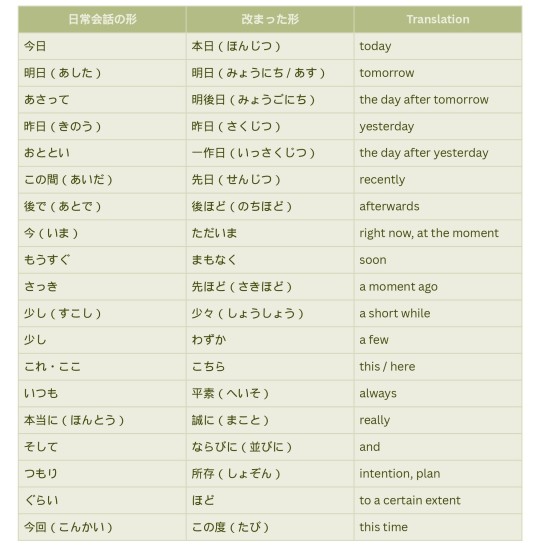
#文法#敬語#japanese langblr#langblr#studyblr#study movitation#learning japanese#japanese vocabulary#japan#japanese#study blog#study notes#language blog#keigo#japanese studyblr#japanese grammar#japanese language#日本語#日本語の勉強#nihongo
380 notes
·
View notes
Text
JLPT N2 Grammar げ
Meaning: looks like, seems like, appears to be
Note: ~げ becomes a な-adjective
な-adjective → remove な
入学式の朝、息子はとても不安げだったが、学校から帰ってくると、明るい表情だった。
にゅうがくしき の あさ、むすこ は とても ふあんげ だった が、がっこう から かえって くる と、あかるい ひょうじょう だった。
On the morning of the school entrance ceremony, my son looked nervous, but when he returned home from school, he had a cheerful expression.
い-adjective → remove い (irregular: いい/よい → よさ)
あの人は寂しげな目をしている。
あの ひと は さびしげ な め を して いる。
That person has a lonely look in their eyes.
Verb → (stem form) remove ます
ずいぶん、自信ありげだね。
ずいぶん、じしん ありげ だね。
You seem very confident.
Verb → (tai form) remove い
あの子はケーキを食べたげな顔をしている。
あの こ は ケーキ を たべたげ な かお を して いる。
That child has a look on their face like they want to eat the cake.
Noun (very limited)
お客さんに大人げない態度をとってしまった。
おきゃくさん に おとなげ ない たいど を とって しまった。
I took an immature attitude with the customer.
#日本語#japanese#japanese language#japanese langblr#japanese studyblr#langblr#studyblr#japanese grammar#文法#jlpt n2#げ#tokidokitokyo#tdtstudy
47 notes
·
View notes
Text
8月26日カードキャプターさくらの新しい単語

原因 (げんいん) - cause, origin, source
閉鎖 (へいさ) - closing, closure, shutdown, lockout
ひとまとめ - bundle, bunch, pack
放課後 (ほうかご) - after school
冷凍庫 (れいとうこ) - freezer
校舎 (こうしゃ) - school building, schoolhouse
落ち (おち) - slip, omission; outcome, final result; punchline (of a joke)
根性 (こんじょう) - willpower, grit, determination, guts; character, nature
合わせる (あわせる) - to match (a quality of something); to join together, to unite, to add up (among other meanings)
ぶつける - to hit something, to strike, to crash into; to throw; to express
隠れる (かくれる) - to hide, to be hidden, to conceal oneself
固める (かためる) - to harden, to freeze, to solidify, to strengthen (among other meanings)
確かめる (たしかめる) - to ascertain, to check, to make sure
きつい - tough, demanding, harsh; forceful, determined, fierce; tight, constricting
バラバラ - scattered, disperse, loose, in pieces
バッチリ - perfectly; thoroughly, completely, sufficiently
役に立つ (やくにたつ) - to be helpful, to be useful
「お役に立ててよか��たですわ。」
思いつく (おもいつく) - to think of, to come to one’s mind, to be hit with an idea; to remember or recall
「しかし、よう思いついたな。」
お陰で (おかげで) - thanks to…, owing to…, because of…
「雪兎さんのおかげよ。」
#紙鶴 💌#learning japanese#日本語#japanese#japanese langblr#japanese studyblr#japanese vocabulary#単語 ⭐️#文法 🌸#漫画 🎀
56 notes
·
View notes
Text
「こそあど」- The Ko-So-A-Do Words - JLPT N5 Grammar ┃ Genki Lesson 2
youtube
11 notes
·
View notes
Text
Grammar Review: はず
Please note that I am still a beginner in Japanese and the sample sentences are my own, so they may contain mistakes or sound unnatural. If you have any corrections or feedback, then please tell me so I can fix it!
Verb (casual) + はず (+です) Adjective (dictionary form) + はず (+です) Noun + の + はず (+です)
Must, should, is supposed to. Indicates what the speaker expects.
マンチェスターシチはプレミアリーグを勝つはず。Manchester City should win the Premier League.
子どもに教えることは楽しいはず。Teaching children must be fun.
毎日勉強していたから、テストは簡単なはず。Because I've been studying every day, the test should be easy.
スーツを着ている男の人は課長のはずです。The man in the suit must be the manager.
Past tense + はず (present tense): I'm sure X happened Present tense + はず (past tense): I was sure X would happen/X was supposed to happen:
テストが簡単だったはず。The test should have been easy (I didn't take the test, but I expect it was easy)
テストが簡単なはずだった。The test should have been easy (I expected the test to be easy, but it wasn't)
You don't use はず to mean 'should' when giving advice. Instead, use 〜た方がいいよ
疲れたら、寝た方がいいよ!If you're tired, you should sleep.
You don't use はず to mean 'must' as in 'have to'. This is a separate grammar point that would need its own post to explain.
Please let me know if I've made any mistakes!
#japanese#japanese langblr#learning japanese#日本語#japanese grammar#文法#bonus: i learned the word 朝飯前 and asked my japanese friend how to use it with はず#and she said you never use it with things you're unsure about. only things that are 100% certain. so you can't use it with はず!
46 notes
·
View notes
Text
Hi! Hope y'all are good.
My exams went great and I'm finally getting back on track with Japanese. I did a grammar point today, along with some 語彙 and 漢字!
It's definitely difficult lol but it's fun to study something else after so long! 🤍

#japanese#japanese language#jlpt#jlpt n2#languages#studyblr#studying#japanese books#language learning#study with me#語彙#漢字#文法#日本語
23 notes
·
View notes
Text
て-Form + は
晴れてはまた雨が降って、全然外に出られない。 はれては また あめが ふって、ぜんぜん そとに でられない。 As soon as it clears up, it rains again, so I can't go outside at all.
The grammar Verb A in theて-Form + は + Verb B when something happens repeatedly in a cycle.
16 notes
·
View notes
Text
みんなさん、久しぶりです!
お元気ですか?日本語の勉強はどうですか?
じゃ、英語で続けます。👇
ごめんなさい (´°̥̥̥̥̥̥̥̥ω°̥̥̥̥̥̥̥̥`)
〜
My Japanese studies have been on hold for several months - 5 months, in fact (my last post being last August). Life has gotten busy, including graduate classes for a writing certification and dealing with depressive episodes. The past couple of months have been a struggle, but I really want to try my best this year to catch up with my studies and start Genki 2.
As for grammar progress, I'm continuing my Genki 1 review with Marugoto and Tokini Andy (where there's amazingly helpful immersion content, including short stories accompanied with audio as well as shadowing content). I'm working on compiling my notes across Word documents I originally made years ago for Genki 1 content.
As for kanji, I have put a pause on WaniKani and decided to try Tokini Andy's kanji learning method. I really struggled with the kanji reading mnemonics, especially trying to come up with some on my own when I found the WK ones lacking in memorability. I also had trouble learning readings on their own first, before learning vocabulary. Andy's method can be summed up as a hybrid between rote memorization, RTK, and WaniKani. He uses SRS, mnemonics, and writing practice to reinforce learning, and the N5 kanji series on his YouTube channel also includes interesting kanji history. I find it really appealing that his method focuses first on English meanings of kanji, using stroke order, official radicals, and mnemonics to reinforce the meaning, and then incorporating grammar and vocabulary words in the form of full sentences later on. Also, a key point is that kanji are built up sequentially, so you learn 口 first before learning �� (even though "mouth" and "four" aren't semantically related) and then you use a story to relate them to one another (e.g. mine is Domo-kun has a person's legs dangling out of his square-shaped mouth).
I'm not technically starting from scratch with kanji, as I do know a good portion of the N5 kanji already. However, I downloaded the Anki decks for both the N5 kanji and the vocabulary on TKA (which requires a paid membership, so I will not be sharing that content here) and started the first 5 cards in each deck - for a total of 10 cards done today. I'll most likely take my own notes in a notebook so I can keep track of my progress in a more tangible way.
Lastly, as for diary entries, I feel that I put too much pressure on myself before to blog more regularly. I'll aim for one entry per week, but if I don't post, I won't beat myself up about it. I'll also try to keep the entries short to be less intimidating to start (and read).
That's it for now. またね!
10 notes
·
View notes
Text



Parte 2:Razones por las que a los japoneses jamás se le va a dar bien el inglés: Sean bienvenidos, japonistasarqueológicos, a una nueva entrega, en esta ocasión hablamos del inglés en Japón, una vez dicho esto pónganse cómodos qué empezamos. - Por la que a los japoneses les cuesta el inglés más de una te sorprenderá, los japoneses para poder aprender inglés desde cero les lleva alrededor de 500 horas alcanzar el nivel principiante; sin embargo, se necesitan unas 250 horas para aprender coreano o indonesio al mismo nivel principiante. Una de las razones por las que los japoneses no son buenos en inglés es debido a la pronunciación, esto es un hecho. - La estructura gramatical del inglés es: SVO (sujeto-verbo-objeto) donde el verbo va primero, mientras que en japonés, SOV (Sujeto-Objeto-Verbo) donde el verbo va al final. Además, la estructura de las oraciones difiere entre el inglés y el japonés, el inglés es muy estricto en cuanto al orden de las palabras. En japonés utilizamos unas 120 palabras en un minuto de conversación normal. El inglés emplea aproximadamente 1,5 veces más palabras, razón por la cual los japoneses sienten que hablan inglés más rápido. Por ejemplo, la palabra japonesa “personalidad” tiene tres fonemas. Cuando se trata de inglés, necesitamos cinco fonemas: pa/so/na/li/ti, y para transmitir la misma información, necesitamos hablar más rápido. La razón por la que a los japoneses les resulta difícil escuchar y hablar inglés es probablemente porque se les exige que usen habilidades que normalmente no emplean. パート2:日本人が決して英語が得意にならない理由:日本の考古学者たちよ、新しい回へようこそ!今回は日本の英語について話す。 - なぜ日本人は英語が苦手なのか?日本人がゼロから英語を学んで初級レベルに達するには約500時間かかるが、韓国語やインドネシア語を学んで同じ初級レベルに達するには約250時間かかる。日本人が英語を苦手とする理由のひとつに発音があるが、これは事実である。 - 英語の文法構造はSVO(Subject-Verb-Object)で動詞が先に来るのに対し、日本語はSOV(Subject-Object-Verb)で動詞が最後に来る。また、文の構造も英語と日本語では異なり、英語は語順に非常に厳しい。日本語の場合、通常の会話で1分間に使う単語は約120語。英語はその約1.5倍の単語を使うので、日本人は英語を話すのが早いと感じるのです。例えば、日本語の「パーソナリティ」という単語には3つの音素がある。それが英語になると、パ/ソ/ナ/リ/ティの5つの音素が必要になり、同じ情報を伝えるためには、より速く話す必要がある。日本人が英語を聞くのも話すのも難しいと感じるのは、普段使わない能力を要求されるからだろう。 - 今後の記事でお会いできることを楽しみにしています。 Part 2: Reasons why the Japanese will never be good at English: Welcome, Japanese archaeologists, to a new instalment, this time we are talking about English in Japan, so make yourselves comfortable and let's get started. - Why the Japanese have a hard time with English more than one will surprise you, it takes the Japanese around 500 hours to learn English from scratch to reach beginner level; however, it takes around 250 hours to learn Korean or Indonesian to the same beginner level. One of the reasons why Japanese people are not good at English is because of pronunciation, this is a fact. - The grammatical structure of English is: SVO (Subject-Verb-Object) where the verb comes first, while in Japanese, SOV (Subject-Object-Verb) where the verb comes last. Also, sentence structure differs between English and Japanese, English is very strict about word order. In Japanese we use about 120 words in one minute of normal conversation. English uses about 1.5 times as many words, which is why Japanese people feel they speak English faster. For example, the Japanese word "personality" has three phonemes. When it comes to English, we need five phonemes: pa/so/na/li/ti, and to convey the same information, we need to speak faster. The reason why Japanese people find it difficult to listen to and speak English is probably because they are required to use skills they do not normally use. - I hope you like it and see you in future posts, have a good week.
16 notes
·
View notes
Text
Japanese JLPT N3 Study Post #1
Hello friends! I don't have much expectation for anyone to really engage with these posts, but for the sake of my own study and ensuring that grammar points in particular stick with me, I will be making various blog posts about my progress. These posts will usually include grammar, kanji and new vocab. They will also start including translation progress notes for light novels (e.g. the Twisted Wonderland Light Novels) which I am particularly keen to translate. I hope these notes will be helpful for other Japanese Language learners!
To study grammar points, I am using JLPT Sensei , and going through the N3 Grammar Points one by one. I will also be cross-referencing with my textbook (when I remember where I put it, haha), and other sites, where needed. I'll include the links for these down the bottom, for anyone who would find them useful. If you have any resources, suggestions, or corrections, feel free to comment them below!

Grammar Point: あまり (amari)
"So much ... That ..."
"To the point that"
When ない form/negative form is used, it becomes:
"Not much"
"Not so much"
The positive form puts emphasis on something done to an excess with negative connotations.
This grammar point is derived from the noun/adverb 余り(あまり)which translates to "remainder", "rest" or "surplus".
余り is also the noun version of 余る. When in a verb form, 余る means "to be in excess", "to remain", "to be too much".
This grammar point will be seen both using the kanji 余り and hiragana あまり。
How to use it:
Positive Form:
Verb (dictionary form) + あまり
Verb (casual, past) + あまり
Noun + の + あまり
Adjective い (み) + の + あまり
Adjective い(さ)+ の + あまり
Adjective な + あまり
Negative Form:
あまり + Verb + ない あまり + Adjective い in ない form (where い becomes くない)
あまり + Adjective な + じゃない/ではない
あまり + Noun + じゃない/ではない 例文
Examples
あまり寒くないよ。It's not that cold.

嬉しさのあまり、彼女は涙を��しました。She was so happy that she cried.

彼は心配するあまり、倒れてしまった。He was so worried that he collapsed.

Conclusion
Thank you for reading, and I hope this was somewhat helpful for you!
References
^^For whatever reason, the link wasn't inserting properly for the page on あまり so you can find it as the second grammar point on this list. See you next time!
#japanese#language stuff#language#language learning#study notes#japanese learning#japanese language#日本語#日本語の勉強#日本語文法
24 notes
·
View notes
Text
🥁🌲(��˘▿˘)🎸💬(ര‿ര๑ ) 🌲🎶 🎶𝕊𝕠𝕞𝕖𝕥𝕚𝕞𝕖𝕤 𝕀 𝕨𝕚𝕤𝕙 𝕀 𝕜𝕟𝕖𝕨 𝕪𝕠𝕦 𝕨𝕖𝕝𝕝🎶
Get to know someone with these 𝟭𝟭 Japanese Questions!
👩🏫We’ll help you with the answers
-📚ー
🔊𝐈 𝐖𝐚𝐧𝐭 𝐭𝐨 𝐓𝐞𝐥𝐥 𝐘𝐨𝐮 | ⑪ 𝘽𝙖𝙨𝙞𝙘 𝙅𝙖𝙥𝙖𝙣𝙚𝙨𝙚 𝙌𝙪𝙚𝙨𝙩𝙞𝙤𝙣𝙨 (𝙵𝚒𝚛𝚜𝚝 𝙼𝚎𝚎𝚝𝚒𝚗𝚐)
-💬ー
👋(๑・ω・๑)[◜▿◝]🗯️👋(๑・ω・๑) QUIZBO™ joins to pronounce useful questions for a first meetingー We even have some example answers to help you form your own sentences!
#japanese#japanese language#langblr#language#learn japanese#learnjapanese#kiki#koko#language learning#languages#japan#日本語#日本語の勉強#日本語勉強#単語#文法#語彙
3 notes
·
View notes
Text

This post is an addition to 敬語の5分類|The 5 Types of keigo.
尊敬語の特定形
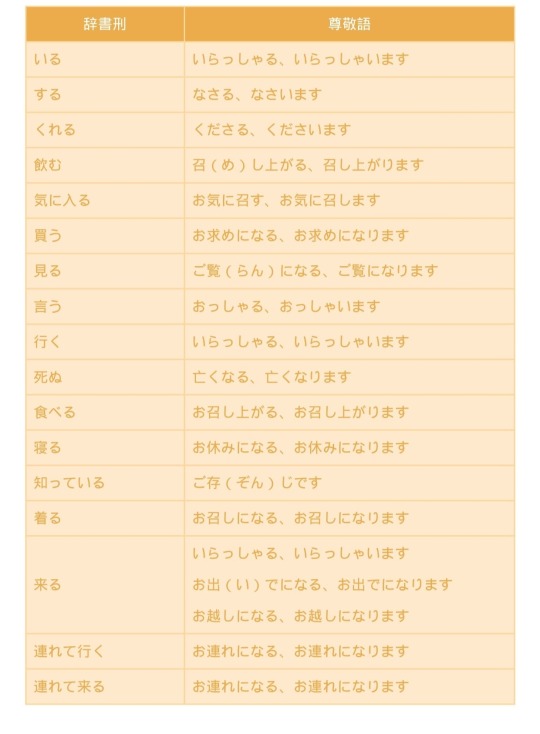
謙譲語Ⅰの特定形
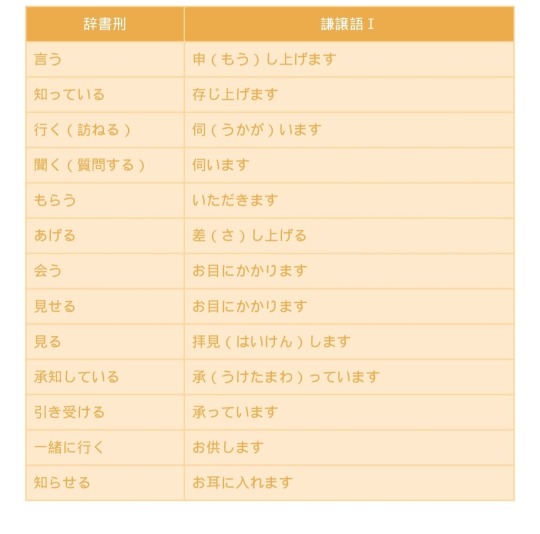
謙譲語Ⅱの特定形
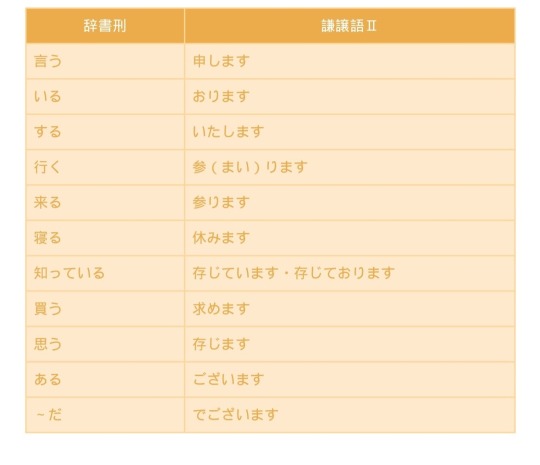
#文法#敬語#japanese langblr#learning japanese#japanese vocabulary#japanese#japanese language#keigo#study notes#japanese studyblr#japanese studyspo#japanese grammar#nihongo#日本語#日本語の勉強
103 notes
·
View notes
Text
JLPT Grammar みたいだ・らしい・っぽい
What is the difference in usage among みたいだ、らしい、and っぽい? These grammar points can be difficult to differentiate, so I have gathered some notes and examples here. These grammar points are JLPT N4 or N3 grammar points.
★みたいだ★

Used for first-hand information or information you are observing for yourself.
Often used for something that has characteristics of something else (metaphorical similarities).
Most common in spoken language.
ここの砂は星みたいな形をしている。 ここ の すな は ほし みたいな かたち を して いる。 The grains of sand here are in the shape of a star.
このアパートは誰も住んでいないみたいだ。 この アパート は だれ も すんで いない みたい だ。 It looks like no one lives in this apartment building.
明日は雨みたいね。 あした は あめ みたい ね。 It looks like rain tomorrow.
リンさんみたいに日本語がうまくなりたい。 I want to be able to speak Japanese as well as Lin.
★らしい★

Used for things you infer, or information you have from another source.
Often used to something that has especially strong characteristics of its group (stereotypical similarities).
Most common in spoken language.
今日は春らしい暖かい日でした。 きょう は はる らしい あたたかい ひ でした。 Today was a warm spring-like day. *Note: It is spring, and this is a stereotypically spring day.
私は女性らしい洋服はあまり着ない。 わたし は じょせい らしい ようふく は あまり きない。 I don't often wear feminine type clothes.
寝すぎるのは体に悪いらしいです。 ねすぎる の は からだ に わるい らしい です。 Sleeping too much is apparently bad for your body. *Note: Second-hand source of information.
今日は君らしくないな。 きょう は きみ らしくない な。 You don't seem like yourself today.
★っぽい★
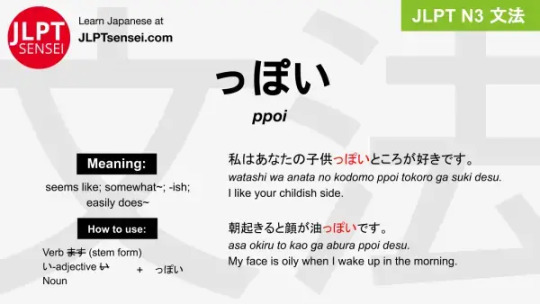
Can be used to say what something is like.
Can be used to say that something appears to be the opposite of what you would expect.
Can be used to describe something that someone is likely to do or often does.
Note:
When following a noun or い-adjective, the meaning is similar to -ish, -like, -ly. The number of adjectives that can be used with this grammar are limited. Usually negative when used after a noun or adjective, but not always.
When following a verb, the meaning is easy to do, often do. This grammar cannot be used with all verbs.
あの小学生は大人っぽい。 あの しょうがくせい は おとなっぽい。 That elementary school student acts like an adult.
油っぽい食事は好きじゃない。 あぶらっぽい しょくじ は すき じゃ ない。 I don't like oily foods.
飽きっぽいから何事も成功しないのだ。 あきっぽい から なにごと も せいこう しない の だ。 You don't succeed in anything because you are quick to lose interest.
年を取ると、忘れっぽくなる。 とし を とる と、わすれっぽく なる。 As one gets older, one tends to become more forgetful.
#日本語#japanese#japanese language#japanese langblr#japanese studyblr#langblr#studyblr#文法#japanese grammar#jlpt n3#jlpt n4#tokidokitokyo#tdtstudy
158 notes
·
View notes
Text
🛒(๑◒ω◒)💦(◒ω◒๑)💦🛒 ᵏᵉᵗᶜʰᵘᵖ🥫・・・🥫 ᶜᵃᵗˢᵘᵖ
In way over your head with Japanese existential verbs?
🌟We’ll guide you!
📖 Choose the best verb for the scenario & learn appropriate particles!
-🏫ー
𝐏𝐫𝐚𝐜𝐭𝐢𝐬𝐞: 𝐄𝐱𝐢𝐬𝐭𝐞𝐧𝐭𝐢𝐚𝐥 𝐕𝐞𝐫𝐛𝐬 「いる」/「ある」 [𝚀𝚄𝙸𝚉]
#kiki#koko#japanese#learnjapanese#langblr#langblog#japanese langblr#日本語#study#quizbo#learn japanese#japanese grammar#japanese language#language learning#languages#learn language#language#日本語勉強#日本語の勉強#文法#nihongo
2 notes
·
View notes